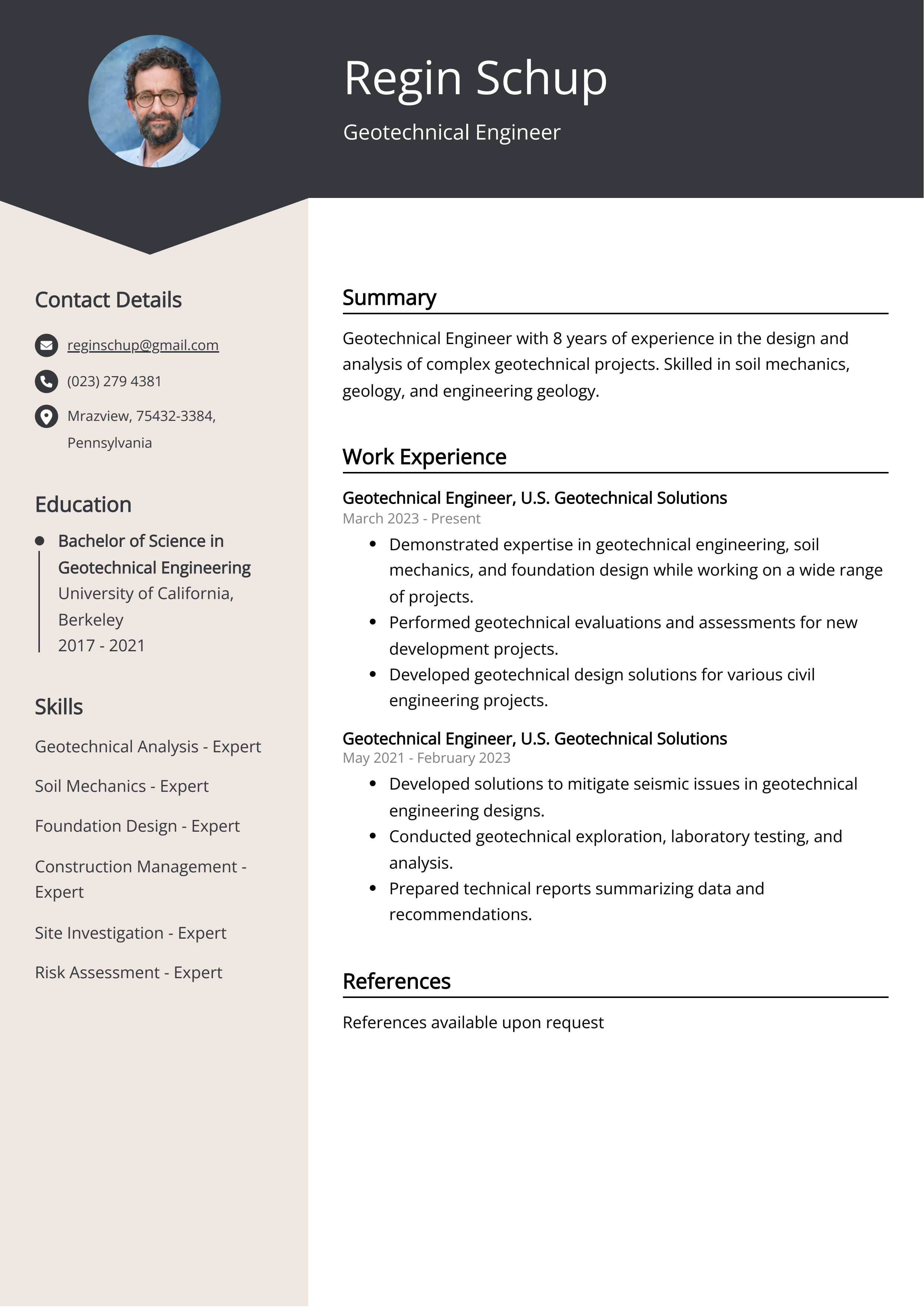Getting The Geotheta To Work
Wiki Article
Fascination About Geotheta
Table of ContentsThe Ultimate Guide To Geotheta9 Simple Techniques For GeothetaThe Main Principles Of Geotheta The Facts About Geotheta UncoveredThe 3-Minute Rule for Geotheta

They perform website investigations, accumulate examples, execute laboratory tests, and evaluate information to review the suitability of the ground for building jobs - Geo Tech Engineer. Based upon their findings, geotechnical designers give recommendations for structure design, slope stability, maintaining frameworks, and reduction of geotechnical threats. They collaborate with various other experts, such as designers, structural designers, and building and construction teams, to ensure that geotechnical factors to consider are incorporated right into the general project layout and implementation
By analyzing the actions and residential properties of dirt and rock, they can determine possible geotechnical risks such as landslides, soil negotiation, or incline instability. Their experience aids prevent failures or mishaps that could jeopardize lives and home. Right here are some detailed responsibilities and obligations of a geotechnical engineer: Site Investigation: Geotechnical designers conduct website investigations to collect data on subsurface conditions.
They analyze the data to understand the homes and habits of the soil and rock, including their toughness, permeability, compaction qualities, and groundwater conditions. Geotechnical Evaluation and Layout: Geotechnical designers evaluate the information collected throughout site examinations to examine the stability and viability of the site for building and construction tasks. They execute geotechnical calculations and modeling to review factors such as birthing capacity, settlement, incline security, side earth pressures, and groundwater flow.
Things about Geotheta
Foundation Design: Geotechnical engineers play a crucial duty in developing foundations that can safely support the intended framework. They evaluate the dirt conditions and load needs to establish the appropriate structure type, such as superficial structures (e.g., grounds), deep structures (e.g (https://www.avitop.com/cs/members/geotheta.aspx)., stacks), or specialized strategies like soil renovation. They take into consideration factors such as negotiation restrictions, bearing capacity, and soil-structure communication to create optimal structure layoutsThey assess construction strategies, screen website activities, and carry out field inspections to verify that the style recommendations are followed. If unanticipated geotechnical concerns arise, they assess the scenario and offer referrals for removal or modifications to the layout. Threat Assessment and Reduction: Geotechnical engineers assess geotechnical risks and threats related to the job website, such as landslides, liquefaction, or soil erosion.

Partnership and Communication: Geotechnical designers function closely with other professionals associated with a project, such as architects, structural engineers, and building teams. Reliable interaction and partnership are vital to integrate geotechnical considerations right into the total project style and construction process. Geotechnical engineers provide technological proficiency, answer queries, and make sure that geotechnical requirements are fulfilled.
Geotheta Things To Know Before You Buy
Below are some sorts of geotechnical engineers: Foundation Designer: Structure engineers specialize in developing and assessing foundations for structures. They assess the soil conditions, load needs, and website features to identify the most appropriate foundation type and style, such as shallow foundations, deep structures, or specialized strategies like pile structures.They assess the aspects affecting slope security, such as soil residential or commercial properties, groundwater problems, and slope geometry, and create strategies to avoid slope failures and mitigate threats. Earthquake Designer: Quake engineers concentrate on analyzing and creating frameworks to hold up against seismic forces. They analyze the seismic danger of a site, examine dirt liquefaction possibility, and develop seismic layout criteria to guarantee the security and resilience of frameworks throughout earthquakes.
They execute field screening, gather examples, and assess the accumulated data to define the dirt buildings, geologic formations, and groundwater conditions at a site. Geotechnical Instrumentation Designer: Geotechnical instrumentation engineers concentrate on surveillance and determining the habits of soil, rock, and frameworks. They set up and keep instrumentation systems that keep track of aspects such as dirt negotiation, groundwater degrees, slope motions, and structural displacements to assess efficiency and supply very early cautions of possible concerns.
Geotheta Fundamentals Explained
They perform examinations such as triaxial examinations, debt consolidation examinations, straight shear tests, and permeability tests to gather information for geotechnical analysis and style. Geosynthetics Designer: Geosynthetics engineers focus on the layout and application of geosynthetic materials, such as geotextiles, geogrids, and geomembranes. They use these products to enhance soil stability, enhance slopes, supply drainage solutions, and control disintegration.They have a tendency to be investigative individuals, which indicates they're intellectual, reflective, and curious. They are interested, methodical, sensible, analytical, and rational. A few of them are likewise social, indicating they're kind, charitable, participating, individual, caring, helpful, understanding, tactful, and friendly. Does this seem like you? Take our totally free occupation examination to figure out if geotechnical designer is just one of your top career suits.
In the workplace setting, geotechnical engineers make use of specialized software program tools to perform calculations, develop designs, and assess data. They prepare reports, review job requirements, communicate with clients and group participants, and coordinate task activities. The workplace setup gives a helpful atmosphere for research study, analysis, and partnership with other experts included in the project.
The Ultimate Guide To Geotheta
They frequently go to task sites to conduct website investigations, assess geotechnical problems, and gather data for evaluation. These brows through involve traveling to various areas, sometimes in remote or challenging terrains. Geotechnical designers may execute soil sampling, conduct tests, and screen building tasks to make certain that the geotechnical aspects of the project are being carried out correctly.Geotechnical designers likewise function in specialized geotechnical laboratories. In these facilities, they conduct experiments, do examinations on soil and rock samples, and assess the engineering residential properties of the products. Geotechnical research laboratory engineers work extensively in these atmospheres, dealing with testing tools, running instruments, and taping information. They team up with other laboratory team to make certain accurate and reputable screening outcomes.
Report this wiki page